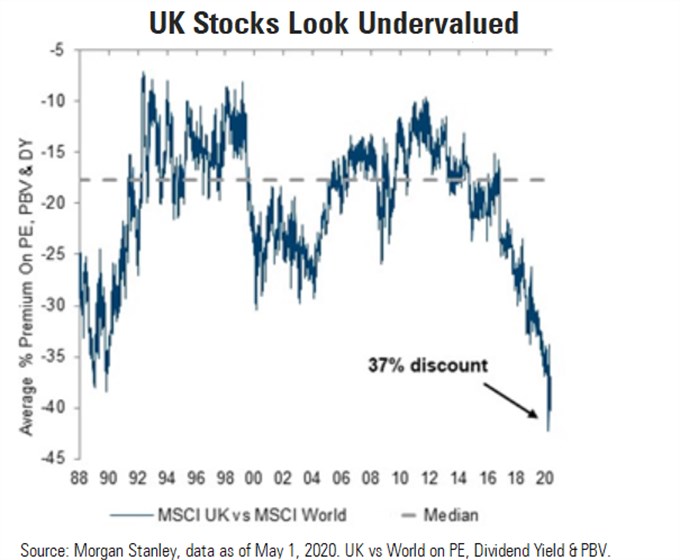
The UK is still playing catch-up at the moment; both its stock market and its recovery from the Covid-19 crisis.
With fears of a second wave of the coronavirus, a swathe of big dividend cuts, and Brexit uncertainty still clouding the outlook, investors could be forgiven for feeling pessismistic about the outlook. But these fund managers insist there are still plenty of opportunities for investors:
Blue-Chip Businesses
The UK has underperformed global markets, especially the US, but this also means that valuations are very cheap, says Chris Kinder, manager of the Silver-Rated Threadneedle UK Equities fund. He estimates that, on average, UK shares are trading a whopping 37% below their fair value. Kinder focuses on three main themes within his portfolio: defensive businesses, UK value and global growth.

In the first bucket are companies with earnings that are stable and predictable, both in good times and bad. These include the likes of pharmaceutical company GSK (GSK) and tobacco companies Imperial Brands (IMB) and British American Tobacco (BATS). Bats is one of our 4 Udervalued Stocks.
In the UK value bucket, meanwhile, fall British TV channel ITV (ITV) and kitchen supplier Howdens (HWDN). “But we do have more than just companies with UK domestic economy exposure,” says Kinder. Indeed businesses which tap into the global growth theme offer more of an international outlook; two examples are financial services giant Standard Chartered (STAN) and Jersey plumbing and heating products manufacturer Ferguson (FERG).
Mid and Small-Cap Companies
Many investors think of small- and mid-cap companies as investments for a bull market, says James Thorne, fund manager of the three-star rated Threadneedle UK Smaller Companies. These businesses are often associated with faster growth and greater volatility. But Thorne says avoiding such stocks at times of uncertainty is a mistake. "It’s the worst thing you could do,” he says. “You should allocate to them at the bottom of the economic cycle, when confidence is at its lowest and expected returns at that point are very high indeed.”
He admits that investing in such companies can mean enduring significant bouts of volatility, and these smaller enterprises are often more vulnerable than their more established counterparts. Yet, the structural changes we have seen in working from home and using technologies are stronger in this part of the market, insists Thorne. He adds: “If you can be brave, investing during a crisis is the best thing you could do.”
His fund has produced annualised returns of 8.18% over the past five years, 5.9 percentage point ahead of its Morningstar Category Average. While the fund is down 12.67% year to date, its top performing holding is personal protection equipment maker Avon Rubber (AVON); its share price bounced as the company won a four-year contract with the US army.
Stick to What you Know
Alexandra Jackson, manager of the three-star rated Rathbone UK Opportunities fund, has been taking advantage of cheap valuations to top up some of the existing holdings she has liked for a long time. “My approach is very opportunistic,” she says, ”it’s very easy in this environment to make decisions in terms of sectors, but there are lots of companies out there that are so different, especially in the mid-cap space.”
She likes two warehouse players, Segro (SGRO) and Warehouse REIT (WHR), which have benefitted from the increased number of online shopping users. “Warehouse REIT is smaller, but much closer to cities and town,” she adds.
Private rental sector is another appealing sector, she says, pointing to Grainger (GRI) as one example of a stock she likes. “If you rent a house from Grainger, you will have high standards," says Jackson. "It has an app where you can report leaks and everything gets repaired a lot quicker. It’s a better way to rent and I see people wanting better living situations.”
She has also topped up investments in online media company Future (FUTR) and AB Dynamics (ABDP), which supply test systems for the global automotive industry. “Future owns 50 magazines, including ones which contain things such as the top 10 laptops of the year and a link to the Amazon's website – it means they make money in different ways.”
Of AB Dynamics, she says the company got sold down in March as people worried about the autos sector. “But testing still has to go on," she says. “Investing in this company is a lower risk way to get some cyclical exposure."
For the UK investor who can cut through the short-term noise, there could be many bargains to be had while the stockmarket continues its staggered recovery. But focusing on the long-term is not always easy when the value of your savings is falling fast. Jackson says: "We've been here a few times before; the worst will pass and everything will be fine."





























